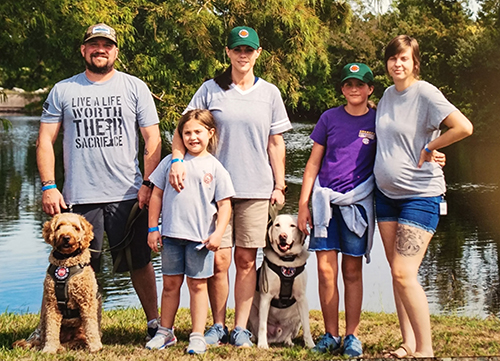
Tips for Staying Tobacco Free

Ready to learn more about living tobacco free?
Download a PDF of Living Tobacco Free: A Toolkit for Military and Veteran Family Caregivers today!
Get the toolkitEvery moment you don’t smoke or use tobacco is a success. Each previous attempt to stop using tobacco is a “practice run” that allows you to learn and adapt so that you can succeed the next time. Change is a process.
Because it may take more than one attempt to be able to fully stop using tobacco, we want to provide you some quick tips for relapse prevention and staying Tobacco Free. Deciding to live a tobacco-free life is just the first step!
- Remind yourself that beginning to smoke again (even one puff) will increase urges and make quitting more difficult than before;
- Focus on the positive aspects of your life;
- Learn about yourself—your stressors, triggers and what makes you calm;
- Find alternative outlets, approaches, and means to handle your problems;
- Never take your recovery for granted;
- Continuously remind yourself why you made the decision to quit smoking;
- Continue to review the health benefits of quitting—you may have even begun to
- experience such benefits at this point;
- Learn to cope with all of your feelings in a healthy way. This includes the positive and healthy feelings. You can celebrate and grieve without using tobacco.
Monitoring Urges and Cravings:
- You should monitor your urges and cravings to smoke so as to better understand the situations and reasons that reinforce them;
- Those urges and desires to smoke will pass. It usually only takes 3 to 5 minutes for a craving to pass;
- You can overcome those cravings by learning cognitive and behavioral coping responses;
- You can identify those responses by writing down the times of day that they are at the biggest risk of lapsing;
- You should also write down five substitutes for any situation in which you might smoke;
- Once you have identified your coping responses it is important to avoid high-risk situations;
- This will ease the quitting process for you. If you feel like you’re about to slip, apply your list of “substitutes” before giving in to the urge to smoke.
Read the full tip sheet for staying tobacco free by downloading the FREE PDF for Living Tobacco Free: A Toolkit for Military and Veteran Family Caregivers.
Learn more about what works and doesn't work when it comes to stopping tobacco use.








 “Streaming is both accessible and not accessible,” Evans said. “The streaming part itself is accessible, in that it allows me to make my own schedule, and I can work it around my disabilities. However, the inaccessible part is the demand for content creators to constantly be networking, attending events and continuously pushing out content. I cannot attend events, and if I can they’re incredible stressful, so all my work networking has basically been done online, which thankfully is becoming a more acceptable side of content creation.”
“Streaming is both accessible and not accessible,” Evans said. “The streaming part itself is accessible, in that it allows me to make my own schedule, and I can work it around my disabilities. However, the inaccessible part is the demand for content creators to constantly be networking, attending events and continuously pushing out content. I cannot attend events, and if I can they’re incredible stressful, so all my work networking has basically been done online, which thankfully is becoming a more acceptable side of content creation.” “I must say over the years it has become less and less accessible for me,” Martínez said. “SMA (Spinal Muscular Atrophy) causes strength, endurance and mobility loss as time passes. I can’t use a physical keyboard as I used to, so it’s been years now with an on-screen keyboard. Voice dictation doesn’t work well for me due to my voice being inconsistent, not to mention my accent. In English it can go from totally wrong to acceptable. In Spanish, my native language, it works better.”
“I must say over the years it has become less and less accessible for me,” Martínez said. “SMA (Spinal Muscular Atrophy) causes strength, endurance and mobility loss as time passes. I can’t use a physical keyboard as I used to, so it’s been years now with an on-screen keyboard. Voice dictation doesn’t work well for me due to my voice being inconsistent, not to mention my accent. In English it can go from totally wrong to acceptable. In Spanish, my native language, it works better.” “What drew me to consulting was the opportunity to leverage my unique perspective as both an able-bodied and disabled gamer to improve the gaming experience for others,” Lane said. “I can share the frustrations I’ve faced as a disabled gamer and use that knowledge to advocate for better accessibility features. Companies and studios that I work with go the extra mile to make sure I have everything I need to succeed.”
“What drew me to consulting was the opportunity to leverage my unique perspective as both an able-bodied and disabled gamer to improve the gaming experience for others,” Lane said. “I can share the frustrations I’ve faced as a disabled gamer and use that knowledge to advocate for better accessibility features. Companies and studios that I work with go the extra mile to make sure I have everything I need to succeed.”



Connect with us on social media